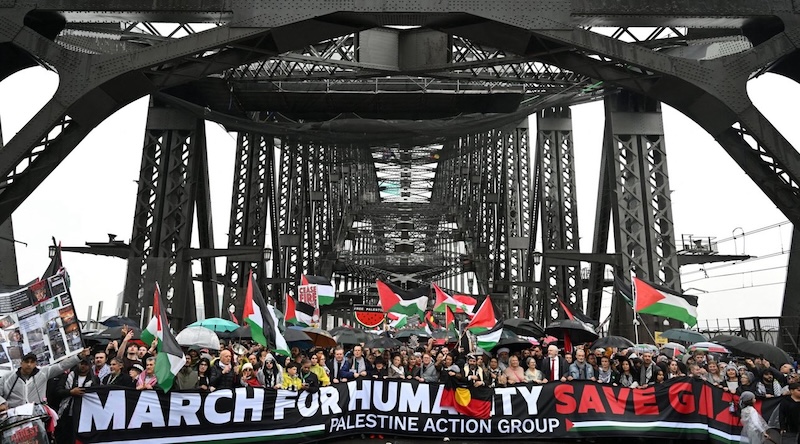Public pressure is rising to sanction Israel over war crimes in Gaza in the wake of the March for Humanity across Sydney Harbour Bridge. Stephanie Tran reports.
In one of the largest protest events in our nation’s history, hundreds of thousands of Australians marched across Sydney Harbour Bridge over the weekend.
It was a striking show of public outrage at the government’s failure to take meaningful action to stop the genocide in Gaza. Yet despite the clear public support for decisive action, the Albanese government has done little beyond issuing statements.
Prime Minister Anthony Albanese has acknowledged that Israel is breaching international law by blocking food deliveries into the territory and joined 28 world leaders in calling for an end to Israel’s war on Gaza.
However, Australia continues to supply key components for F‑35 fighter jets used by Israel and maintains lucrative defence contracts worth billions of dollars with Israeli arms manufacturers, including Rafael Advanced Defense Systems and Elbit Systems.
“Snuff videos as a sales pitch”. Rafael boasts of human testing in Gaza death camps
Russia – a double standard on sanctions
Australia has imposed more than 1,400 sanctions on Russia over its invasion of Ukraine, but just a dozen on Israel.
The Greens argue that a Russia‑style sanctions regime targeting Israel would affect about $50 million in exports, around a third of Australia’s exports to Israel, but stress that broader measures would also be necessary.
“For months now, the Albanese Government has been repeatedly told by international legal experts, human rights groups and millions of Australians that they need to sanction the Israeli Government and end the two‑way arms trade,” Greens Senator David Shoebridge said.
“In the case of Russia, Australia has imposed harsh and appropriate sanctions that stop the export of weapons and other goods that support Russia’s illegal war against Ukraine. In the case of Israel, you have the Foreign Minister trying to convince people that parts for fighter jets are ‘non‑lethal’ and the Prime Minister dismissing a comprehensive sanctions regime as a ‘slogan.’ The double‑speak is deeply troubling.”
“International legal experts have made clear that even with these sanctions, more will likely need to be done to meet Australia’s obligations under international law. The test set down by the ICJ not engaging in any trade that entrenches the occupation”
Calls for greater sanctions on Israel
Following the International Court of Justice’s July 2024 ruling that Israel’s occupation of Palestinian territory is illegal, Australia imposed limited sanctions on seven Israeli settlers involved in violent attacks against Palestinians in the West Bank. In June 2025, the government expanded sanctions to include Israel’s national security minister, Itamar Ben‑Gvir, and finance minister, Bezalel Smotrich, for their incitement of violence against Palestinians.
However, international law experts argue that a more comprehensive approach is needed, including trade sanctions, a full arms embargo, and the use of Australia’s Magnitsky sanctions regime against senior Israeli officials.
Australia has the power to impose such measures under the Autonomous Sanctions Act 2011, which gives the government authority to implement targeted financial, trade, and travel sanctions independently of the United Nations.
In 2021, parliament strengthened these powers by adopting the Magnitsky‑style amendments, enabling Australia to impose sanctions on individuals and entities responsible for serious human rights abuses and corruption.
According to international human rights lawyer Benedict Coyne, these laws have already been used against Russian officials following the invasion of Ukraine and should now be applied to senior Israeli leaders.
“In 2022, Australia used the Magnitsky laws for the first time, sanctioning 39 Russian individuals accused of serious corruption and human rights abuses. Australia can and should impose Magnitsky sanctions on responsible Israeli government and military leaders, especially those who have espoused genocidal rhetoric.”
Australia can and should impose immediate political, diplomatic and economic sanctions on Israel.
Coyne also suggests that trade restrictions should be imposed to ensure Australia is not complicit in the ongoing assault on Gaza.
“Australia should refuse any trade from Israel and immediately halt all aid and export licences, including cancelling export licences for weapons, F‑35 fighter jet parts and any dual‑use components,” he said.
Australia once led the way on sanctions
During the 1980s campaign against apartheid South Africa, then Prime Minister Bob Hawke was instrumental in leading the Commonwealth in imposing financial sanctions against the regime. Hawke later reflected on the turning point, explaining:
“Trade sanctions weren’t working so I had this concept that if we could boycott foreign investment in South Africa we could bring it to an end. The investment boycott was the dagger which finally immobilised apartheid.”
Coyne highlighted this event as an example of Australia’s historic leadership on sanctions.
“There is precedent for this. In the 1980s, Bob Hawke took a lead with the Commonwealth Heads of Government, even against Margaret Thatcher, who was not comfortable with imposing these sanctions against apartheid South Africa. And he won. Nelson Mandela later attributed those sanctions as a key factor in ending apartheid.”
Red-Lines Package
In addition to sanctions, there are calls to ensure Australia is not economically tied to acts of genocide or war crimes. Central to this push is the Red Lines Package, a set of three bills poised for reintroduction this year, potentially with broader cross‑bench support.
The package will introduce critical legal safeguards to prevent businesses and the government from supporting genocide, war crimes and crimes against humanity.
The package includes three bills:
- Bans on defence exports linked to genocide, war crimes, or crimes against humanity and due diligence requirements on the defence minister.
- A bill stopping the Future Fund and Australian charities from investing in businesses supporting illegal settlement activity.
- A bill requiring Australian government agencies, large companies and businesses involved in weapons manufacturing to disclose their supply chains, ensuring they don’t contribute to genocide.
MWM understands that the bills are currently being reviewed and strengthened before being reintroduced.
Australia’s Voice Senator Fatima Payman said the package was about giving parliament a moral compass, stating,
Hopefully, the government builds up the moral courage to do what needs to be done.
“We’ve been waiting two years and counting. What more do you need to see? We can’t just keep turning a blind eye to this anymore. The silence is deafening. There’s only so much people can take.”
A legal obligation to act
In January 2024, the International Court of Justice (ICJ) ruled that Israel’s actions in Gaza constitute a “plausible genocide”. The ICJ’s finding is significant because it does not require proof of genocide beyond reasonable doubt but rather recognises that there is a serious risk of genocide occurring, a threshold that activates states’ obligations under international law.
Multiple human rights organisations, including Amnesty International, Human Rights Watch, and prominent genocide scholars, have reached similar conclusions, warning that Israel’s indiscriminate targeting and deliberate starvation of the Palestinian population meet several indicators of genocidal intent.
Australia is a signatory to the Genocide Convention, a treaty born from the atrocities of the Holocaust. Article I of the Convention obliges states not only to punish genocide after it occurs but to actively prevent it. This is known as the due diligence obligation; states must use all means reasonably available to them to prevent genocide from happening.
According to Rawan Arraf, Executive Director of the Australian Centre for International Justice, the ICJ ruling has practical consequences for Australia.
“This ruling demands concrete steps Australia must take. The government must immediately review its economic ties to Israel and impose targeted sanctions. All defence industry partnerships must be suspended, and a two-way arms embargo imposed. This means the government must halt any export of arms and arms components to Israel, including exports being diverted through other countries. Any extant permits must be suspended.”
Failing to take such steps risks Australia being complicit in grave breaches of international law.
Why the reluctance?
So why has the Albanese government resisted calls for a comprehensive sanctions regime? Shoebridge argues that Australia’s alliance with the US under the AUKUS agreement is a key factor.
“When it comes to Australia’s international relations, especially Israel and Palestine, there is an elephant in the room, and it is called AUKUS,” he said. “A large part of AUKUS is to integrate Australia’s military and our industrial and research base with the US. Because of that, Albanese is not comfortable stopping the arms trade with Israel, worried about the US response.
“Australians are looking for a win‑win solution here that has us cancel AUKUS and use that to take a meaningful step towards independence by ending the arms trade with Israel,” he said.
“Unfortunately, Albanese and modern Labor have gone so far to the right on defence and so deep into Trump’s new America that they have lost touch with the public on this.”
I hope the show of humanity on the Sydney Harbour Bridge can remind them who they represent.
Stephanie is a journalist with a background in both law and journalism. She has worked at The Guardian and as a paralegal, where she assisted Crikey’s defence team in the high-profile defamation case brought by Lachlan Murdoch. Her reporting has been recognised nationally, earning her the 2021 Democracy’s Watchdogs Award for Student Investigative Reporting and a nomination for the 2021 Walkley Student Journalist of the Year Award.

